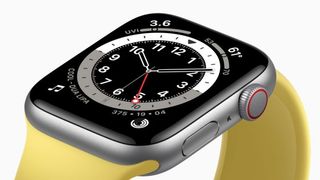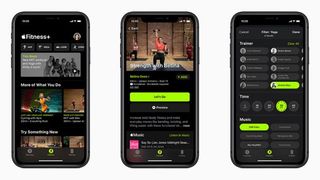Apple Announce Two New Apple Watches And The Fitness+ Workout App
The Series 6 gets a blood oxygen monitor, the Apple Watch SE offers an affordable option and Apple Fitness+ will suggest workouts

Apple normally announces the next iteration of the Apple Watch at this time of the year… but this time it’s announced two! The Series 6 is the expected upgrade, but there’s also the Apple Watch SE, which removes a few of the more advanced features to lower the price to a starting point of £269 (£299 for the larger size). Both are able to pre-order now and ship on Friday 18th September. Apple has also announced Apple Fitness+, an on-demand workout service that will sync live with Apple Watches. Here’s what you need to know about each one.
Apple Watch Series 6

The headline improvement for the Series 6 is the addition of a SpO2 monitor, which will keep track of your blood oxygen saturation. This is a reasonably common bit of hardware, originally packaged into adventurous Garmin watches to help mountaineers see how they’re acclimatising to altitude. We’ve since seen it in Fitbit smartwatches (the company just released a new watch face to highlight this feature) and Withings devices.
The feature is lacking a clear-cut benefit as yet. Fitbit has long discussed it in relation to sleep apnea, while Apple announced its participation in academic studies to look at its application to managing asthma, the relationship to heart trouble and whether it can be used to give an early-warning signal of respiratory illnesses like COVID-19. Like the Apple Watch ECG feature, it’s worth having in case it comes up with a reading that suggests you should investigate further with your GP – but for most people the reading will be, and stay, in a totally normal range.
The trick Apple will need to pull off is minimising the effect of this hardware on battery life (we normally turn the feature off on our personal Garmin devices to preserve the battery). This will be crucial, especially as the Series 6 will ship with watchOS 7 which includes native sleep tracking for the first time. New chips and processors should help in this regard, with Apple quoting an “all-day 18-hour battery life”.
Buy Apple Watch Series 6 from Apple | From £379
Apple Watch SE

We do like a deal, so we’ve been recommending the Apple Watch 3 since it had its price permanently slashed to £199. Its only failing was a somewhat shaky heart rate monitor, but even with that caveat it was head and shoulders above the competition among fitness smartwatches under £200.
So we’re all over the new Apple Watch SE, which includes the fundamental hardware we really want and runs on the same watchOS 7 as the Series 6. It also performs faster than the Series 3 and has a 30% larger screen. The SE costs closer to £300, but our inclination is to say it’s worth paying more for a faster watch.
Get the Coach Newsletter
Sign up for workout ideas, training advice, reviews of the latest gear and more.
As to whether we’d recommend paying an extra £100 for the Series 6 to get the electrocardiogram and blood oxygen features, that’s a trickier question to answer – complicated further by the price reductions we’d expect on the Series 4 and 5. We’ll say one thing: you won’t be lacking for choice.
Buy Apple Watch SE from Apple | From £269
Apple Fitness+
Call us jaded, but we’ve come to expect Apple Watch upgrades, and the SE repeats the move Apple made previously with iPhones. But Fitness+ made us prick up our ears. Like Fitbit Premium, it’s an add-on subscription service, but in Apple’s case it’s focused on delivering unique workout content, with cycling, treadmill, rowing, HIIT, strength, yoga, dance, core and mindful cooldown sessions covered.
It looks like Apple has a huge advantage here because it can call on its production experience with Apple TV+ to create glossy, high-quality videos to rival the type you’ll find in the Peloton app, but in a wider range and with new workouts added weekly. With its Apple Music credentials we’d also expect Apple to make good on its promise to soundtrack the workouts with music from “renowned artists”.
Fitness+ will suggest workouts based on what you’ve done before, as well as options meant to round out your training. Whether it will take into account how well rested you are, as Polar and the new Garmin Forerunner 745 do, remains to be seen.

Once you choose a workout to stream on your TV, tablet or phone, your Apple Watch will start tracking your session automatically so you can see your heart rate, calorie burn or any other metric available. It’s a simple trick, and one we’ve been disappointed to see that Fitbit Premium can’t manage, but then Fitbit doesn’t make the phone you use the device with as well. Perhaps if Google’s purchase of Fitbit is finally approved we’ll see a similar level of integration there.
Fitness+ looks to be a slick, well-thought-through experience and it will also sync up with some cardio machines that are Apple GymKit-enabled. The service will cost £9.99 a month, which is competitive for this type of service (Fitbit Premium is £7.99 a month, Peloton £12.99 a month and the Fiit workout app £20 a month).
When it launches later this year there will be a free month’s trial for everyone, as well as a three-month trial for Apple Watch owners. It will also be bundled into the £30-a-month Apple One subscription, which includes Apple Music, TV+, News+, Arcade and iCloud.

Jonathan Shannon has been the editor of the Coach website since 2016, developing a wide-ranging experience of health and fitness. Jonathan took up running while editing Coach and has run a sub-40min 10K and 1hr 28min half marathon. His next ambition is to complete a marathon. He’s an advocate of cycling to work and is Coach’s e-bike reviewer, and not just because he lives up a bit of a hill. He also reviews fitness trackers and other workout gear.
